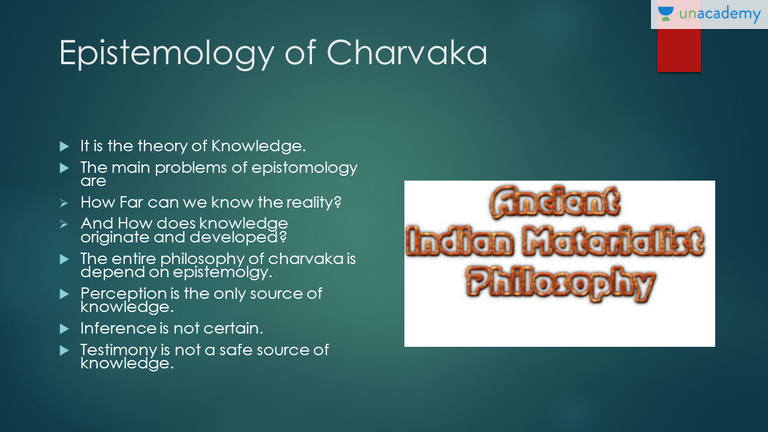You can help by adding to it. Charvaka also known as Lokayata , along with Jainism and Buddhism, is considered part of the heterodox systems also referred to as heresies of Indian philosophy. Roy, Pratap Chandra Give precedence to that which meets the eye and turn your back on what is beyond our knowledge. Kleine Schriften in German. 
| Uploader: | Kazik |
| Date Added: | 24 June 2018 |
| File Size: | 49.80 Mb |
| Operating Systems: | Windows NT/2000/XP/2003/2003/7/8/10 MacOS 10/X |
| Downloads: | 44912 |
| Price: | Free* [*Free Regsitration Required] |
But almost every work of the other schools states, for refutation, the materialistic views. Prabodhacandrodaya of Krsna Misra. External perception is described as that arising from the interaction of five senses and worldly objects, while internal perception is described by this school as that of inner sense, the mind.
Dakshinaranjan, 12 The term "Svabhava" in Sanskrit can be translated to "essence" or "nature.
Charvakas Philosophy
Radhakrishnan, Philosophhy Moore, Charles The accuracy of these views, attributed to Charvakas, has been contested by scholars. Thank you for your feedback. Basham, Arthur Llewellyn Journal of Indian Philosophy. An encyclopedia of philosophy articles written by professional philosophers. They held perception and direct experiments to be the valid and reliable source of knowledge.
Charvakas Philosophy
Charvakas rejected the need for ethics or morals, and suggested that "while life remains, let a man live happily, let him feed on ghee even though he runs in debt". The principles of karma action and niyati fate are rejected because they are derived from the notion that existence in itself is purposeful. Rather, it resembles most closely the naturalism forwarded by the American philosopher John Dewey.
To them all natural phenomena was produced spontaneously from the inherent nature of things. Since it is impossible to have pleasure without pain, Charvaka thought that wisdom lay in enjoying pleasure and avoiding pain as far as possible.
Stay Connected
Those who see India as an entirely religious and spiritual place might do well to look into this philosophy: Charvaka believed that there was nothing wrong with sensual pleasure. Retrieved from " https: Ain-i-Akbaria record of the Mughal Emperor Akbar 's court, mentions a symposium charvakq philosophers of all faiths held in at Akbar's insistence [68] also see Senpp. Mubarak, Abu'l-Fazl ibn Materialists are critical of other ethical systems for being tied to notions of duty or virtue that are derived from false, supernaturalist cosmologies.
It claims nothing more than the rejection of both what we think of now as a Platonic notion of "The Good" along with any notion of philoskphy or "gods. A Study in Ancient Indian Materialism 7th ed. Times Point Know more. However, the authors of these works were thoroughly opposed to materialism and tried to portray the Charvaka in unfavourable light.
A critical survey of Indian philosophy Reprinted. Charvaka's epistemological argument can be explained with the example of fire and smoke. Robert Goldman and Sally J. In 8th century CE Jaina literature, Saddarsanasamuccaya by Haribhadra, [29] Lokayata is stated to be the Hindu school where there is "no God, no samsara rebirthno karma, no duty, no fruits of merit, no sin.
This proves that it had already existed for centuries and had become a generic term by BCE. Add to Spiritual Diary.

These refutations are indirect sources of Charvaka philosophy. Even though such sects did not sustain an independent religious tradition, the undercurrent of their teachings cropped up time and again in the later…. Translated by Henry Sullivan Jarrett.

Comments
Post a Comment